Emotional Intelligence Report: Factors, Strategies, and Leadership
VerifiedAdded on 2020/05/04
|22
|4369
|50
Report
AI Summary
This report delves into the multifaceted concept of emotional intelligence, examining its core components: self-awareness, self-management, social awareness, and relationship management. It explores the interplay between emotions, moods, and personality traits within a team context, identifying factors that influence team mood and analyzing the phenomenon of mood contagion. The report also addresses motivating and demotivating feelings, factors that hinder emotional expression in the workplace, and constructive strategies for emotional release. Furthermore, it differentiates between eustress, distress, hypostress, and hyperstress, while highlighting the benefits of minimizing workplace stress. The report investigates physical, psychological, and behavioral symptoms of stress and proposes strategies for managing emotions at work and fostering emotional intelligence in others, including the characteristics of emotionally intelligent leaders and the consequences of low emotional intelligence. Finally, it examines emotional labor, including surface acting, feeling rules, emotional dissonance, and strategies for dealing with the demands of emotional labor, providing a comprehensive overview of emotional intelligence in professional settings.
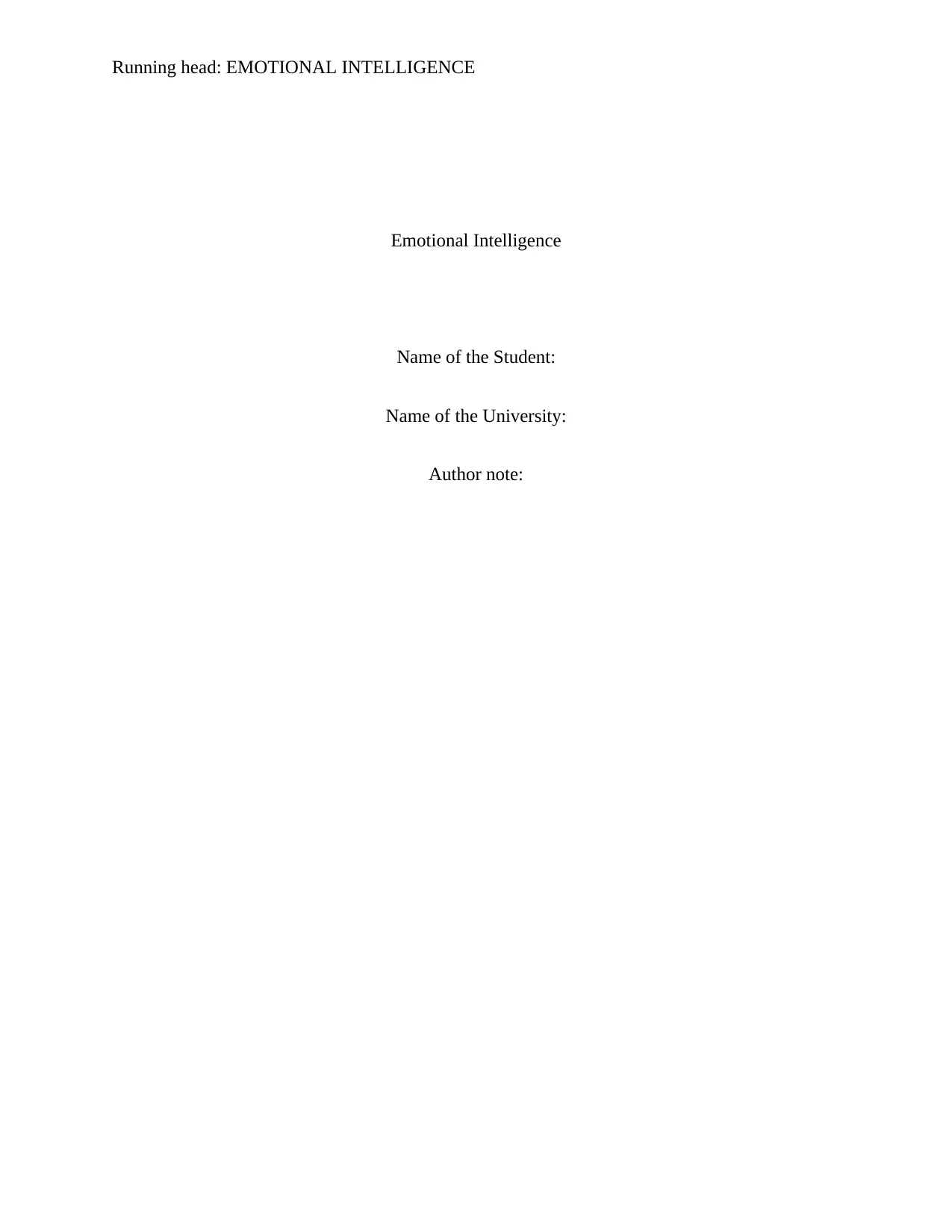
Running head: EMOTIONAL INTELLIGENCE
Emotional Intelligence
Name of the Student:
Name of the University:
Author note:
Emotional Intelligence
Name of the Student:
Name of the University:
Author note:
Paraphrase This Document
Need a fresh take? Get an instant paraphrase of this document with our AI Paraphraser
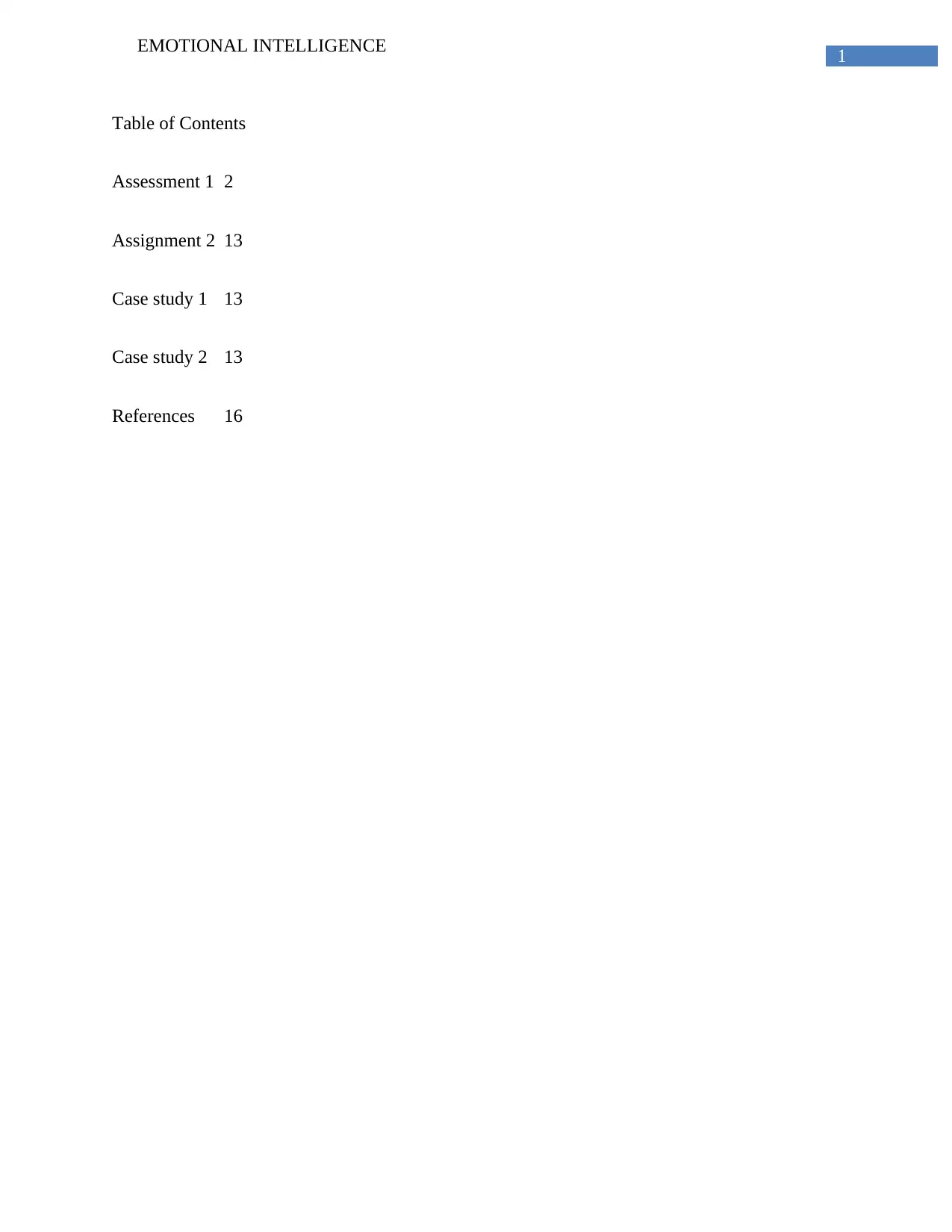
1
EMOTIONAL INTELLIGENCE
Table of Contents
Assessment 1 2
Assignment 2 13
Case study 1 13
Case study 2 13
References 16
EMOTIONAL INTELLIGENCE
Table of Contents
Assessment 1 2
Assignment 2 13
Case study 1 13
Case study 2 13
References 16
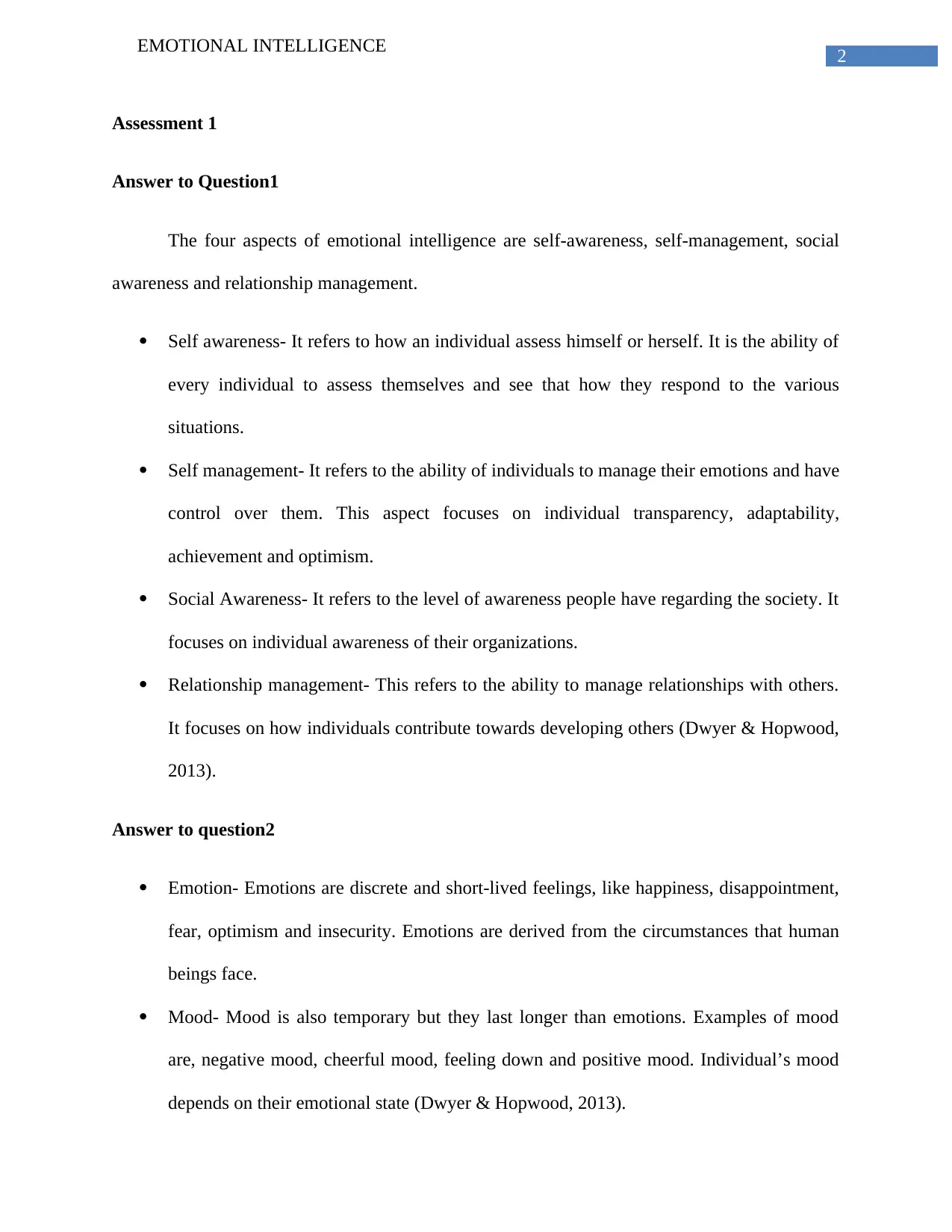
2
EMOTIONAL INTELLIGENCE
Assessment 1
Answer to Question1
The four aspects of emotional intelligence are self-awareness, self-management, social
awareness and relationship management.
Self awareness- It refers to how an individual assess himself or herself. It is the ability of
every individual to assess themselves and see that how they respond to the various
situations.
Self management- It refers to the ability of individuals to manage their emotions and have
control over them. This aspect focuses on individual transparency, adaptability,
achievement and optimism.
Social Awareness- It refers to the level of awareness people have regarding the society. It
focuses on individual awareness of their organizations.
Relationship management- This refers to the ability to manage relationships with others.
It focuses on how individuals contribute towards developing others (Dwyer & Hopwood,
2013).
Answer to question2
Emotion- Emotions are discrete and short-lived feelings, like happiness, disappointment,
fear, optimism and insecurity. Emotions are derived from the circumstances that human
beings face.
Mood- Mood is also temporary but they last longer than emotions. Examples of mood
are, negative mood, cheerful mood, feeling down and positive mood. Individual’s mood
depends on their emotional state (Dwyer & Hopwood, 2013).
EMOTIONAL INTELLIGENCE
Assessment 1
Answer to Question1
The four aspects of emotional intelligence are self-awareness, self-management, social
awareness and relationship management.
Self awareness- It refers to how an individual assess himself or herself. It is the ability of
every individual to assess themselves and see that how they respond to the various
situations.
Self management- It refers to the ability of individuals to manage their emotions and have
control over them. This aspect focuses on individual transparency, adaptability,
achievement and optimism.
Social Awareness- It refers to the level of awareness people have regarding the society. It
focuses on individual awareness of their organizations.
Relationship management- This refers to the ability to manage relationships with others.
It focuses on how individuals contribute towards developing others (Dwyer & Hopwood,
2013).
Answer to question2
Emotion- Emotions are discrete and short-lived feelings, like happiness, disappointment,
fear, optimism and insecurity. Emotions are derived from the circumstances that human
beings face.
Mood- Mood is also temporary but they last longer than emotions. Examples of mood
are, negative mood, cheerful mood, feeling down and positive mood. Individual’s mood
depends on their emotional state (Dwyer & Hopwood, 2013).
⊘ This is a preview!⊘
Do you want full access?
Subscribe today to unlock all pages.

Trusted by 1+ million students worldwide
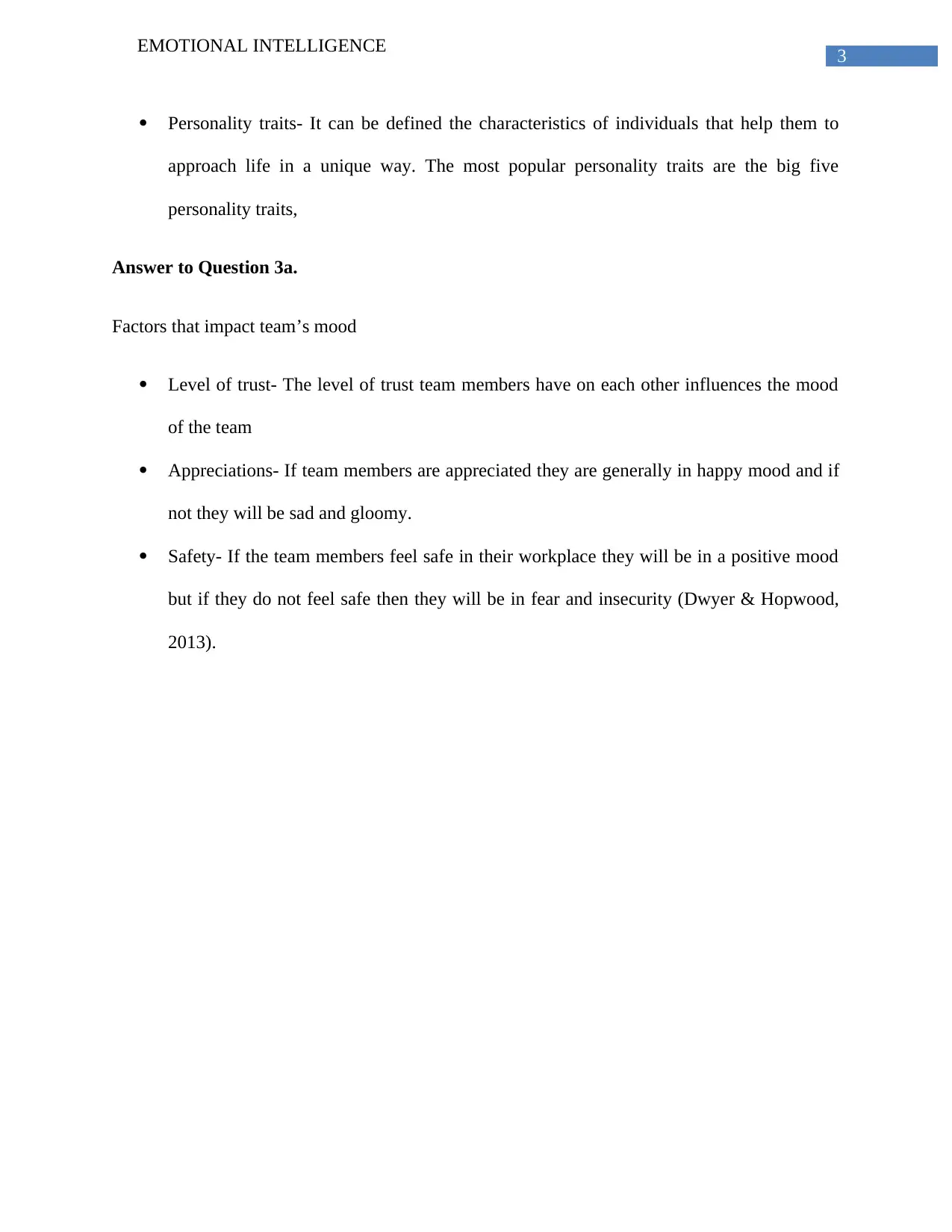
3
EMOTIONAL INTELLIGENCE
Personality traits- It can be defined the characteristics of individuals that help them to
approach life in a unique way. The most popular personality traits are the big five
personality traits,
Answer to Question 3a.
Factors that impact team’s mood
Level of trust- The level of trust team members have on each other influences the mood
of the team
Appreciations- If team members are appreciated they are generally in happy mood and if
not they will be sad and gloomy.
Safety- If the team members feel safe in their workplace they will be in a positive mood
but if they do not feel safe then they will be in fear and insecurity (Dwyer & Hopwood,
2013).
EMOTIONAL INTELLIGENCE
Personality traits- It can be defined the characteristics of individuals that help them to
approach life in a unique way. The most popular personality traits are the big five
personality traits,
Answer to Question 3a.
Factors that impact team’s mood
Level of trust- The level of trust team members have on each other influences the mood
of the team
Appreciations- If team members are appreciated they are generally in happy mood and if
not they will be sad and gloomy.
Safety- If the team members feel safe in their workplace they will be in a positive mood
but if they do not feel safe then they will be in fear and insecurity (Dwyer & Hopwood,
2013).
Paraphrase This Document
Need a fresh take? Get an instant paraphrase of this document with our AI Paraphraser
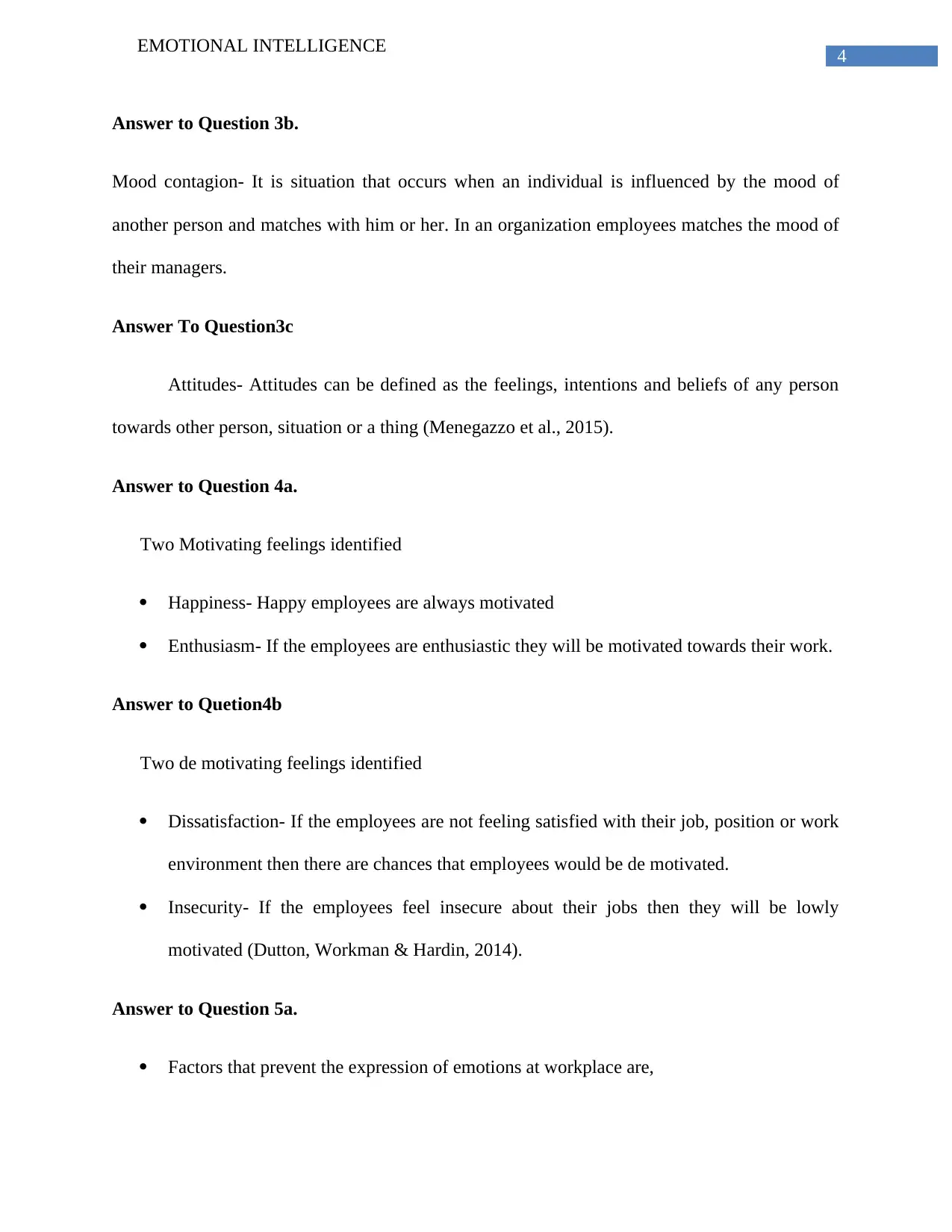
4
EMOTIONAL INTELLIGENCE
Answer to Question 3b.
Mood contagion- It is situation that occurs when an individual is influenced by the mood of
another person and matches with him or her. In an organization employees matches the mood of
their managers.
Answer To Question3c
Attitudes- Attitudes can be defined as the feelings, intentions and beliefs of any person
towards other person, situation or a thing (Menegazzo et al., 2015).
Answer to Question 4a.
Two Motivating feelings identified
Happiness- Happy employees are always motivated
Enthusiasm- If the employees are enthusiastic they will be motivated towards their work.
Answer to Quetion4b
Two de motivating feelings identified
Dissatisfaction- If the employees are not feeling satisfied with their job, position or work
environment then there are chances that employees would be de motivated.
Insecurity- If the employees feel insecure about their jobs then they will be lowly
motivated (Dutton, Workman & Hardin, 2014).
Answer to Question 5a.
Factors that prevent the expression of emotions at workplace are,
EMOTIONAL INTELLIGENCE
Answer to Question 3b.
Mood contagion- It is situation that occurs when an individual is influenced by the mood of
another person and matches with him or her. In an organization employees matches the mood of
their managers.
Answer To Question3c
Attitudes- Attitudes can be defined as the feelings, intentions and beliefs of any person
towards other person, situation or a thing (Menegazzo et al., 2015).
Answer to Question 4a.
Two Motivating feelings identified
Happiness- Happy employees are always motivated
Enthusiasm- If the employees are enthusiastic they will be motivated towards their work.
Answer to Quetion4b
Two de motivating feelings identified
Dissatisfaction- If the employees are not feeling satisfied with their job, position or work
environment then there are chances that employees would be de motivated.
Insecurity- If the employees feel insecure about their jobs then they will be lowly
motivated (Dutton, Workman & Hardin, 2014).
Answer to Question 5a.
Factors that prevent the expression of emotions at workplace are,
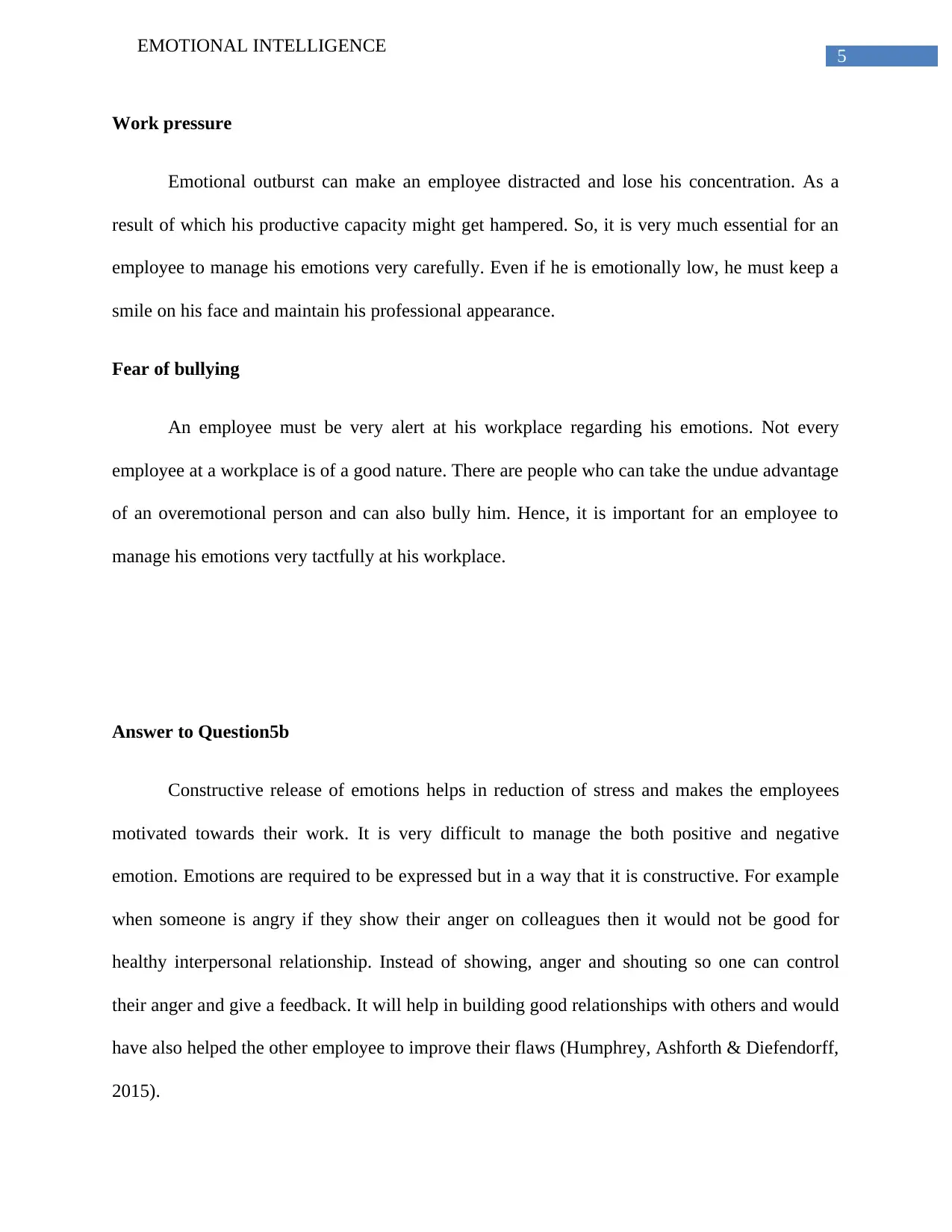
5
EMOTIONAL INTELLIGENCE
Work pressure
Emotional outburst can make an employee distracted and lose his concentration. As a
result of which his productive capacity might get hampered. So, it is very much essential for an
employee to manage his emotions very carefully. Even if he is emotionally low, he must keep a
smile on his face and maintain his professional appearance.
Fear of bullying
An employee must be very alert at his workplace regarding his emotions. Not every
employee at a workplace is of a good nature. There are people who can take the undue advantage
of an overemotional person and can also bully him. Hence, it is important for an employee to
manage his emotions very tactfully at his workplace.
Answer to Question5b
Constructive release of emotions helps in reduction of stress and makes the employees
motivated towards their work. It is very difficult to manage the both positive and negative
emotion. Emotions are required to be expressed but in a way that it is constructive. For example
when someone is angry if they show their anger on colleagues then it would not be good for
healthy interpersonal relationship. Instead of showing, anger and shouting so one can control
their anger and give a feedback. It will help in building good relationships with others and would
have also helped the other employee to improve their flaws (Humphrey, Ashforth & Diefendorff,
2015).
EMOTIONAL INTELLIGENCE
Work pressure
Emotional outburst can make an employee distracted and lose his concentration. As a
result of which his productive capacity might get hampered. So, it is very much essential for an
employee to manage his emotions very carefully. Even if he is emotionally low, he must keep a
smile on his face and maintain his professional appearance.
Fear of bullying
An employee must be very alert at his workplace regarding his emotions. Not every
employee at a workplace is of a good nature. There are people who can take the undue advantage
of an overemotional person and can also bully him. Hence, it is important for an employee to
manage his emotions very tactfully at his workplace.
Answer to Question5b
Constructive release of emotions helps in reduction of stress and makes the employees
motivated towards their work. It is very difficult to manage the both positive and negative
emotion. Emotions are required to be expressed but in a way that it is constructive. For example
when someone is angry if they show their anger on colleagues then it would not be good for
healthy interpersonal relationship. Instead of showing, anger and shouting so one can control
their anger and give a feedback. It will help in building good relationships with others and would
have also helped the other employee to improve their flaws (Humphrey, Ashforth & Diefendorff,
2015).
⊘ This is a preview!⊘
Do you want full access?
Subscribe today to unlock all pages.

Trusted by 1+ million students worldwide
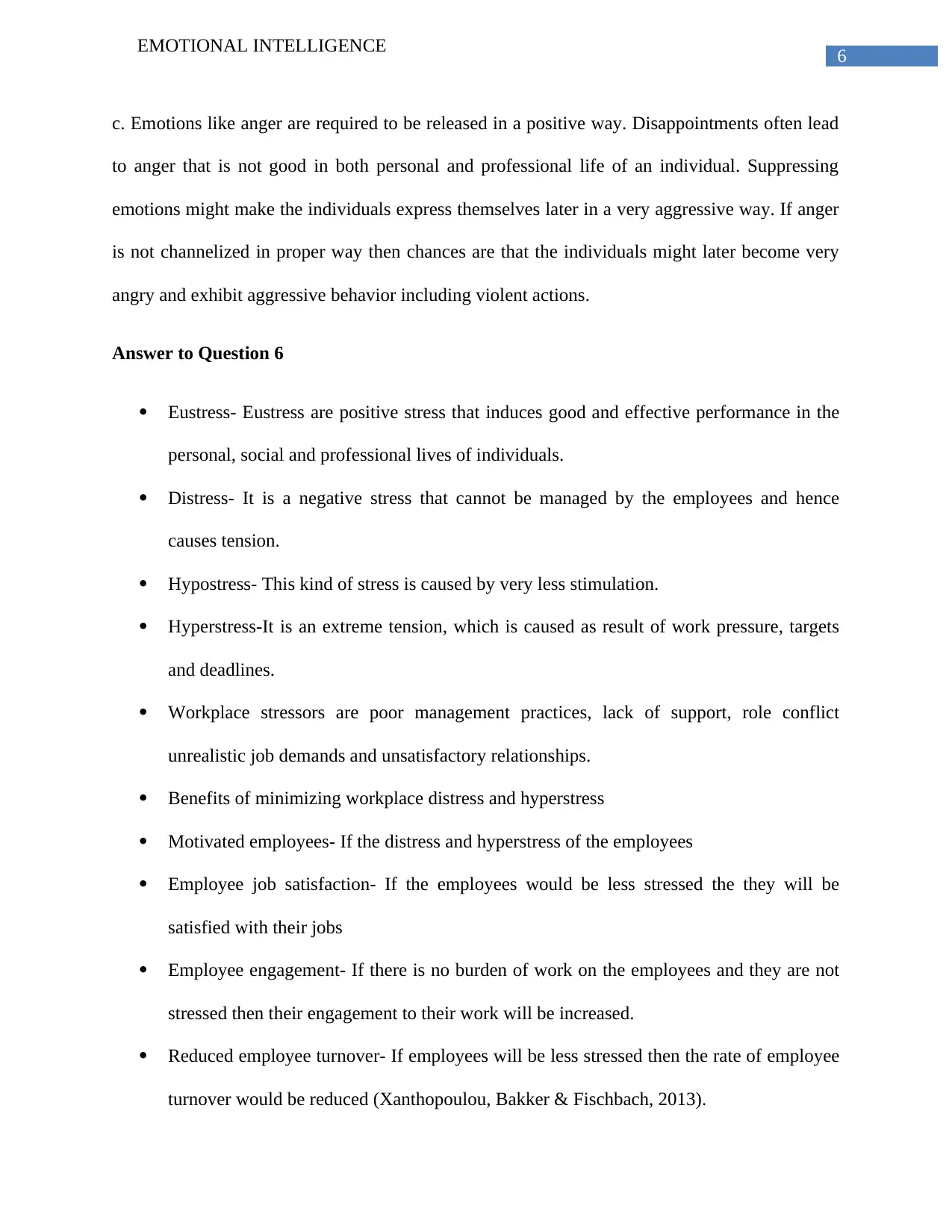
6
EMOTIONAL INTELLIGENCE
c. Emotions like anger are required to be released in a positive way. Disappointments often lead
to anger that is not good in both personal and professional life of an individual. Suppressing
emotions might make the individuals express themselves later in a very aggressive way. If anger
is not channelized in proper way then chances are that the individuals might later become very
angry and exhibit aggressive behavior including violent actions.
Answer to Question 6
Eustress- Eustress are positive stress that induces good and effective performance in the
personal, social and professional lives of individuals.
Distress- It is a negative stress that cannot be managed by the employees and hence
causes tension.
Hypostress- This kind of stress is caused by very less stimulation.
Hyperstress-It is an extreme tension, which is caused as result of work pressure, targets
and deadlines.
Workplace stressors are poor management practices, lack of support, role conflict
unrealistic job demands and unsatisfactory relationships.
Benefits of minimizing workplace distress and hyperstress
Motivated employees- If the distress and hyperstress of the employees
Employee job satisfaction- If the employees would be less stressed the they will be
satisfied with their jobs
Employee engagement- If there is no burden of work on the employees and they are not
stressed then their engagement to their work will be increased.
Reduced employee turnover- If employees will be less stressed then the rate of employee
turnover would be reduced (Xanthopoulou, Bakker & Fischbach, 2013).
EMOTIONAL INTELLIGENCE
c. Emotions like anger are required to be released in a positive way. Disappointments often lead
to anger that is not good in both personal and professional life of an individual. Suppressing
emotions might make the individuals express themselves later in a very aggressive way. If anger
is not channelized in proper way then chances are that the individuals might later become very
angry and exhibit aggressive behavior including violent actions.
Answer to Question 6
Eustress- Eustress are positive stress that induces good and effective performance in the
personal, social and professional lives of individuals.
Distress- It is a negative stress that cannot be managed by the employees and hence
causes tension.
Hypostress- This kind of stress is caused by very less stimulation.
Hyperstress-It is an extreme tension, which is caused as result of work pressure, targets
and deadlines.
Workplace stressors are poor management practices, lack of support, role conflict
unrealistic job demands and unsatisfactory relationships.
Benefits of minimizing workplace distress and hyperstress
Motivated employees- If the distress and hyperstress of the employees
Employee job satisfaction- If the employees would be less stressed the they will be
satisfied with their jobs
Employee engagement- If there is no burden of work on the employees and they are not
stressed then their engagement to their work will be increased.
Reduced employee turnover- If employees will be less stressed then the rate of employee
turnover would be reduced (Xanthopoulou, Bakker & Fischbach, 2013).
Paraphrase This Document
Need a fresh take? Get an instant paraphrase of this document with our AI Paraphraser
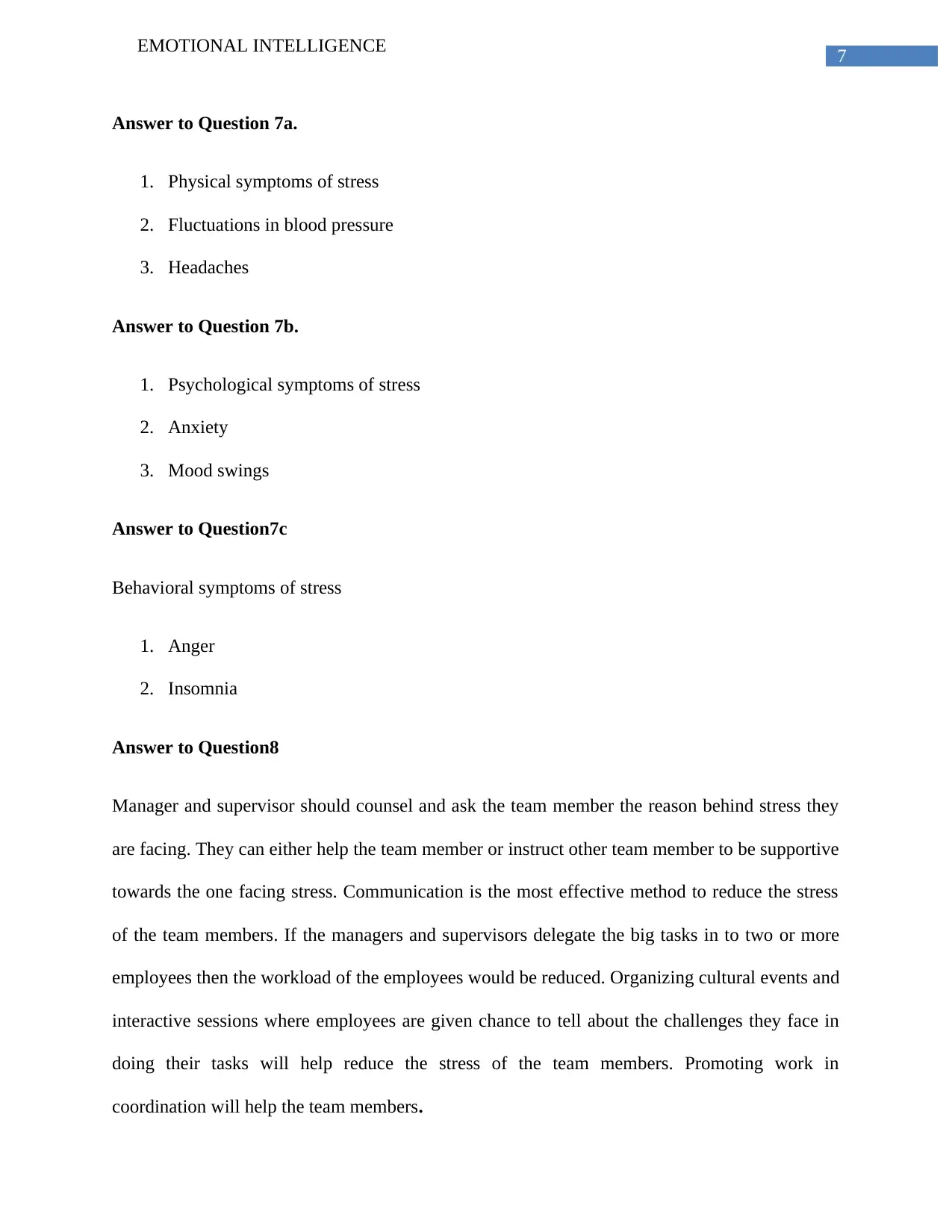
7
EMOTIONAL INTELLIGENCE
Answer to Question 7a.
1. Physical symptoms of stress
2. Fluctuations in blood pressure
3. Headaches
Answer to Question 7b.
1. Psychological symptoms of stress
2. Anxiety
3. Mood swings
Answer to Question7c
Behavioral symptoms of stress
1. Anger
2. Insomnia
Answer to Question8
Manager and supervisor should counsel and ask the team member the reason behind stress they
are facing. They can either help the team member or instruct other team member to be supportive
towards the one facing stress. Communication is the most effective method to reduce the stress
of the team members. If the managers and supervisors delegate the big tasks in to two or more
employees then the workload of the employees would be reduced. Organizing cultural events and
interactive sessions where employees are given chance to tell about the challenges they face in
doing their tasks will help reduce the stress of the team members. Promoting work in
coordination will help the team members.
EMOTIONAL INTELLIGENCE
Answer to Question 7a.
1. Physical symptoms of stress
2. Fluctuations in blood pressure
3. Headaches
Answer to Question 7b.
1. Psychological symptoms of stress
2. Anxiety
3. Mood swings
Answer to Question7c
Behavioral symptoms of stress
1. Anger
2. Insomnia
Answer to Question8
Manager and supervisor should counsel and ask the team member the reason behind stress they
are facing. They can either help the team member or instruct other team member to be supportive
towards the one facing stress. Communication is the most effective method to reduce the stress
of the team members. If the managers and supervisors delegate the big tasks in to two or more
employees then the workload of the employees would be reduced. Organizing cultural events and
interactive sessions where employees are given chance to tell about the challenges they face in
doing their tasks will help reduce the stress of the team members. Promoting work in
coordination will help the team members.
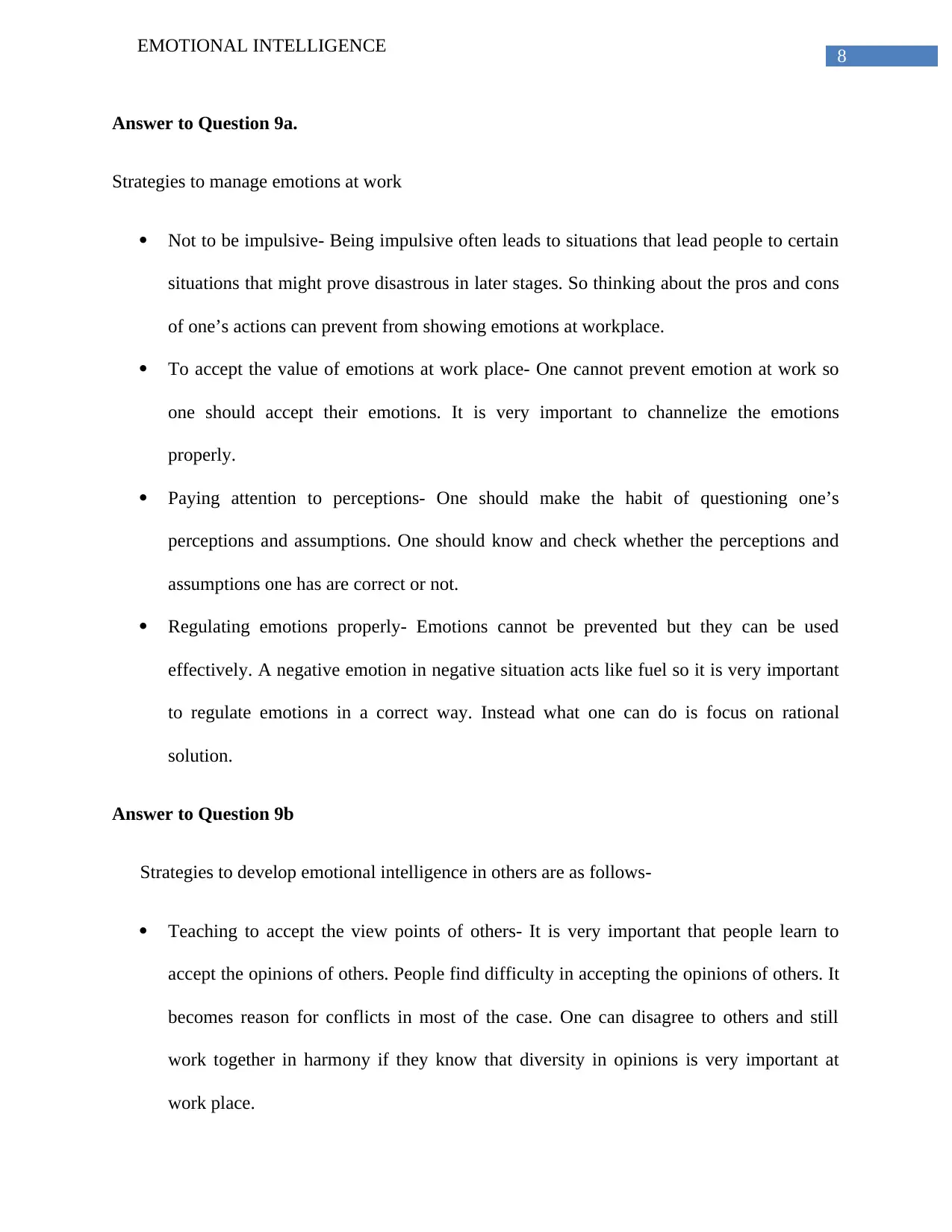
8
EMOTIONAL INTELLIGENCE
Answer to Question 9a.
Strategies to manage emotions at work
Not to be impulsive- Being impulsive often leads to situations that lead people to certain
situations that might prove disastrous in later stages. So thinking about the pros and cons
of one’s actions can prevent from showing emotions at workplace.
To accept the value of emotions at work place- One cannot prevent emotion at work so
one should accept their emotions. It is very important to channelize the emotions
properly.
Paying attention to perceptions- One should make the habit of questioning one’s
perceptions and assumptions. One should know and check whether the perceptions and
assumptions one has are correct or not.
Regulating emotions properly- Emotions cannot be prevented but they can be used
effectively. A negative emotion in negative situation acts like fuel so it is very important
to regulate emotions in a correct way. Instead what one can do is focus on rational
solution.
Answer to Question 9b
Strategies to develop emotional intelligence in others are as follows-
Teaching to accept the view points of others- It is very important that people learn to
accept the opinions of others. People find difficulty in accepting the opinions of others. It
becomes reason for conflicts in most of the case. One can disagree to others and still
work together in harmony if they know that diversity in opinions is very important at
work place.
EMOTIONAL INTELLIGENCE
Answer to Question 9a.
Strategies to manage emotions at work
Not to be impulsive- Being impulsive often leads to situations that lead people to certain
situations that might prove disastrous in later stages. So thinking about the pros and cons
of one’s actions can prevent from showing emotions at workplace.
To accept the value of emotions at work place- One cannot prevent emotion at work so
one should accept their emotions. It is very important to channelize the emotions
properly.
Paying attention to perceptions- One should make the habit of questioning one’s
perceptions and assumptions. One should know and check whether the perceptions and
assumptions one has are correct or not.
Regulating emotions properly- Emotions cannot be prevented but they can be used
effectively. A negative emotion in negative situation acts like fuel so it is very important
to regulate emotions in a correct way. Instead what one can do is focus on rational
solution.
Answer to Question 9b
Strategies to develop emotional intelligence in others are as follows-
Teaching to accept the view points of others- It is very important that people learn to
accept the opinions of others. People find difficulty in accepting the opinions of others. It
becomes reason for conflicts in most of the case. One can disagree to others and still
work together in harmony if they know that diversity in opinions is very important at
work place.
⊘ This is a preview!⊘
Do you want full access?
Subscribe today to unlock all pages.

Trusted by 1+ million students worldwide
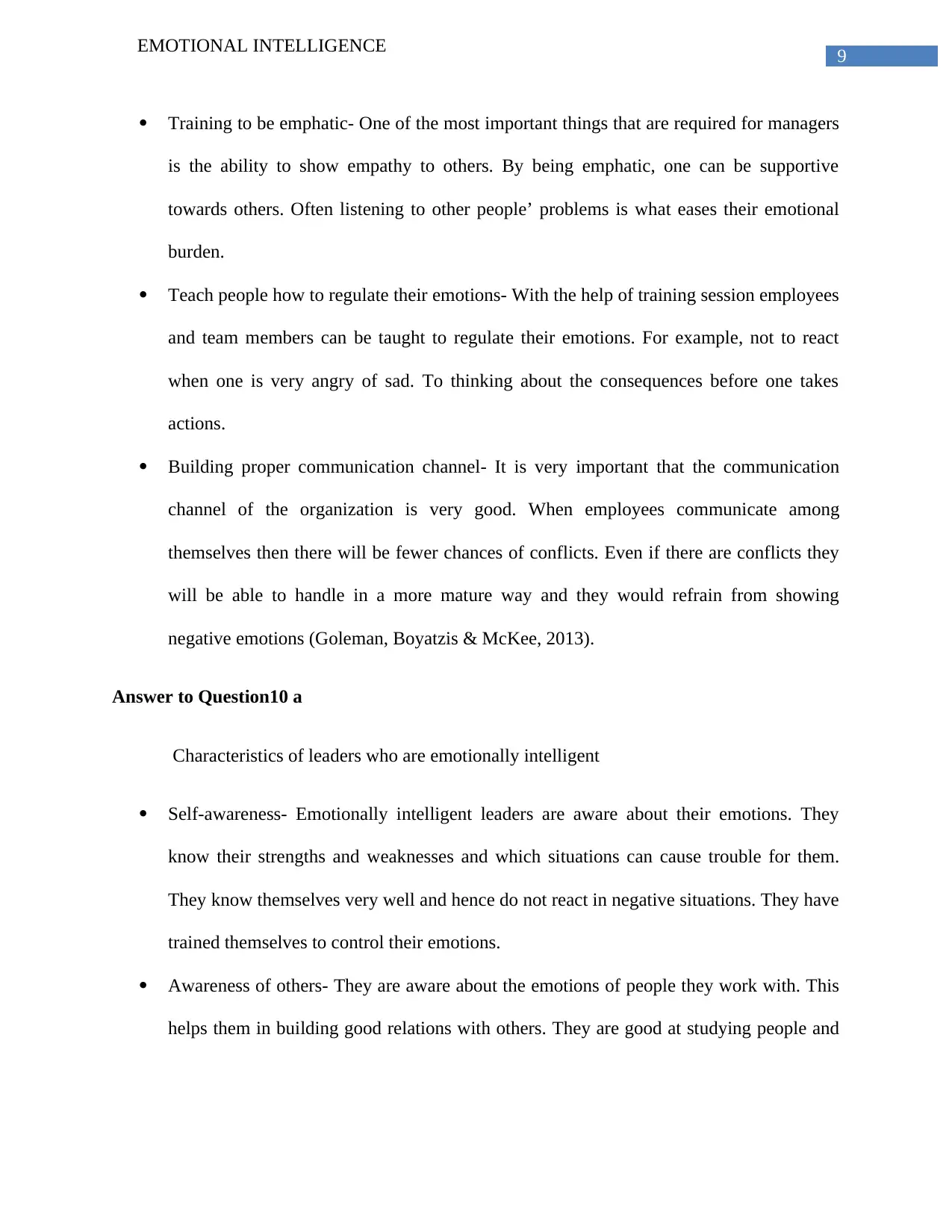
9
EMOTIONAL INTELLIGENCE
Training to be emphatic- One of the most important things that are required for managers
is the ability to show empathy to others. By being emphatic, one can be supportive
towards others. Often listening to other people’ problems is what eases their emotional
burden.
Teach people how to regulate their emotions- With the help of training session employees
and team members can be taught to regulate their emotions. For example, not to react
when one is very angry of sad. To thinking about the consequences before one takes
actions.
Building proper communication channel- It is very important that the communication
channel of the organization is very good. When employees communicate among
themselves then there will be fewer chances of conflicts. Even if there are conflicts they
will be able to handle in a more mature way and they would refrain from showing
negative emotions (Goleman, Boyatzis & McKee, 2013).
Answer to Question10 a
Characteristics of leaders who are emotionally intelligent
Self-awareness- Emotionally intelligent leaders are aware about their emotions. They
know their strengths and weaknesses and which situations can cause trouble for them.
They know themselves very well and hence do not react in negative situations. They have
trained themselves to control their emotions.
Awareness of others- They are aware about the emotions of people they work with. This
helps them in building good relations with others. They are good at studying people and
EMOTIONAL INTELLIGENCE
Training to be emphatic- One of the most important things that are required for managers
is the ability to show empathy to others. By being emphatic, one can be supportive
towards others. Often listening to other people’ problems is what eases their emotional
burden.
Teach people how to regulate their emotions- With the help of training session employees
and team members can be taught to regulate their emotions. For example, not to react
when one is very angry of sad. To thinking about the consequences before one takes
actions.
Building proper communication channel- It is very important that the communication
channel of the organization is very good. When employees communicate among
themselves then there will be fewer chances of conflicts. Even if there are conflicts they
will be able to handle in a more mature way and they would refrain from showing
negative emotions (Goleman, Boyatzis & McKee, 2013).
Answer to Question10 a
Characteristics of leaders who are emotionally intelligent
Self-awareness- Emotionally intelligent leaders are aware about their emotions. They
know their strengths and weaknesses and which situations can cause trouble for them.
They know themselves very well and hence do not react in negative situations. They have
trained themselves to control their emotions.
Awareness of others- They are aware about the emotions of people they work with. This
helps them in building good relations with others. They are good at studying people and
Paraphrase This Document
Need a fresh take? Get an instant paraphrase of this document with our AI Paraphraser
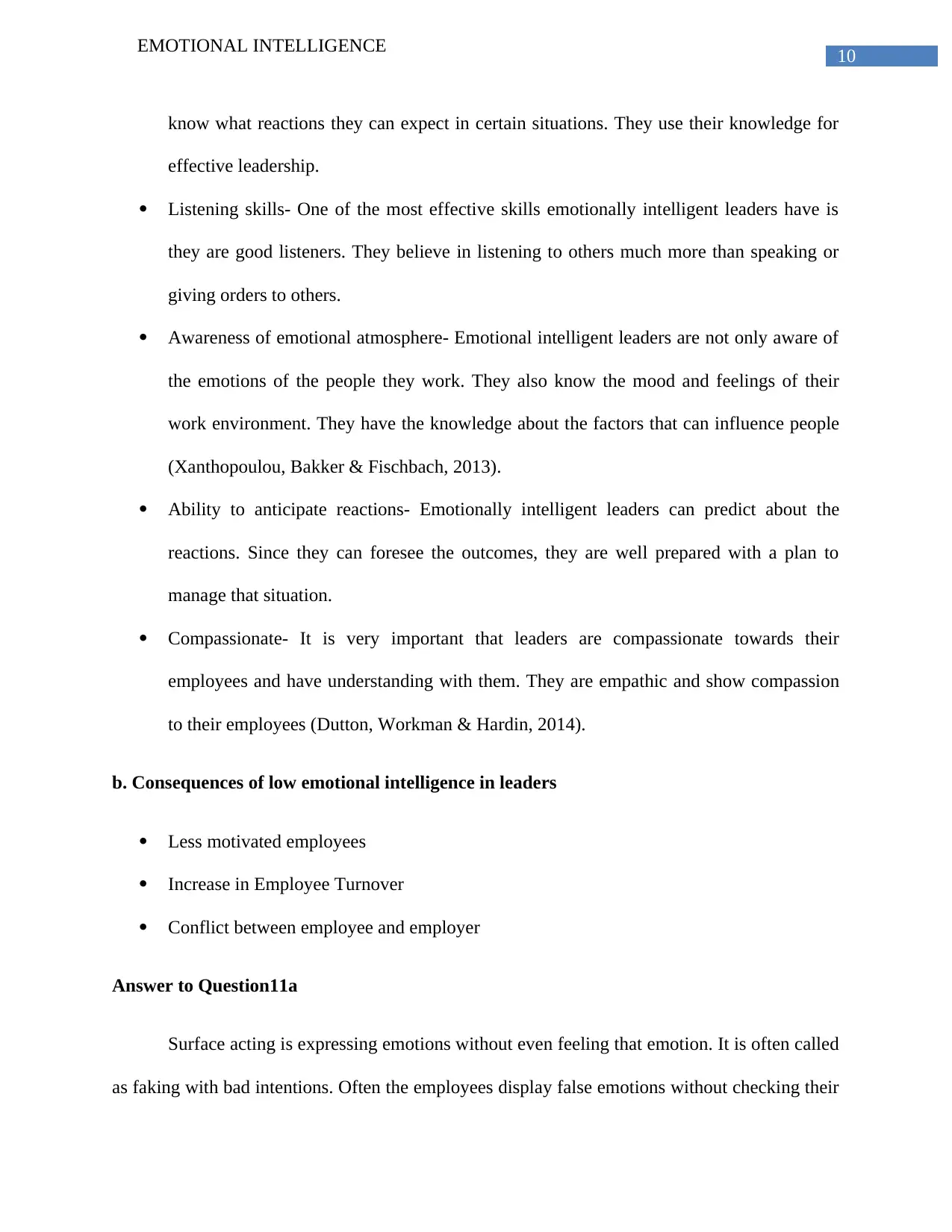
10
EMOTIONAL INTELLIGENCE
know what reactions they can expect in certain situations. They use their knowledge for
effective leadership.
Listening skills- One of the most effective skills emotionally intelligent leaders have is
they are good listeners. They believe in listening to others much more than speaking or
giving orders to others.
Awareness of emotional atmosphere- Emotional intelligent leaders are not only aware of
the emotions of the people they work. They also know the mood and feelings of their
work environment. They have the knowledge about the factors that can influence people
(Xanthopoulou, Bakker & Fischbach, 2013).
Ability to anticipate reactions- Emotionally intelligent leaders can predict about the
reactions. Since they can foresee the outcomes, they are well prepared with a plan to
manage that situation.
Compassionate- It is very important that leaders are compassionate towards their
employees and have understanding with them. They are empathic and show compassion
to their employees (Dutton, Workman & Hardin, 2014).
b. Consequences of low emotional intelligence in leaders
Less motivated employees
Increase in Employee Turnover
Conflict between employee and employer
Answer to Question11a
Surface acting is expressing emotions without even feeling that emotion. It is often called
as faking with bad intentions. Often the employees display false emotions without checking their
EMOTIONAL INTELLIGENCE
know what reactions they can expect in certain situations. They use their knowledge for
effective leadership.
Listening skills- One of the most effective skills emotionally intelligent leaders have is
they are good listeners. They believe in listening to others much more than speaking or
giving orders to others.
Awareness of emotional atmosphere- Emotional intelligent leaders are not only aware of
the emotions of the people they work. They also know the mood and feelings of their
work environment. They have the knowledge about the factors that can influence people
(Xanthopoulou, Bakker & Fischbach, 2013).
Ability to anticipate reactions- Emotionally intelligent leaders can predict about the
reactions. Since they can foresee the outcomes, they are well prepared with a plan to
manage that situation.
Compassionate- It is very important that leaders are compassionate towards their
employees and have understanding with them. They are empathic and show compassion
to their employees (Dutton, Workman & Hardin, 2014).
b. Consequences of low emotional intelligence in leaders
Less motivated employees
Increase in Employee Turnover
Conflict between employee and employer
Answer to Question11a
Surface acting is expressing emotions without even feeling that emotion. It is often called
as faking with bad intentions. Often the employees display false emotions without checking their
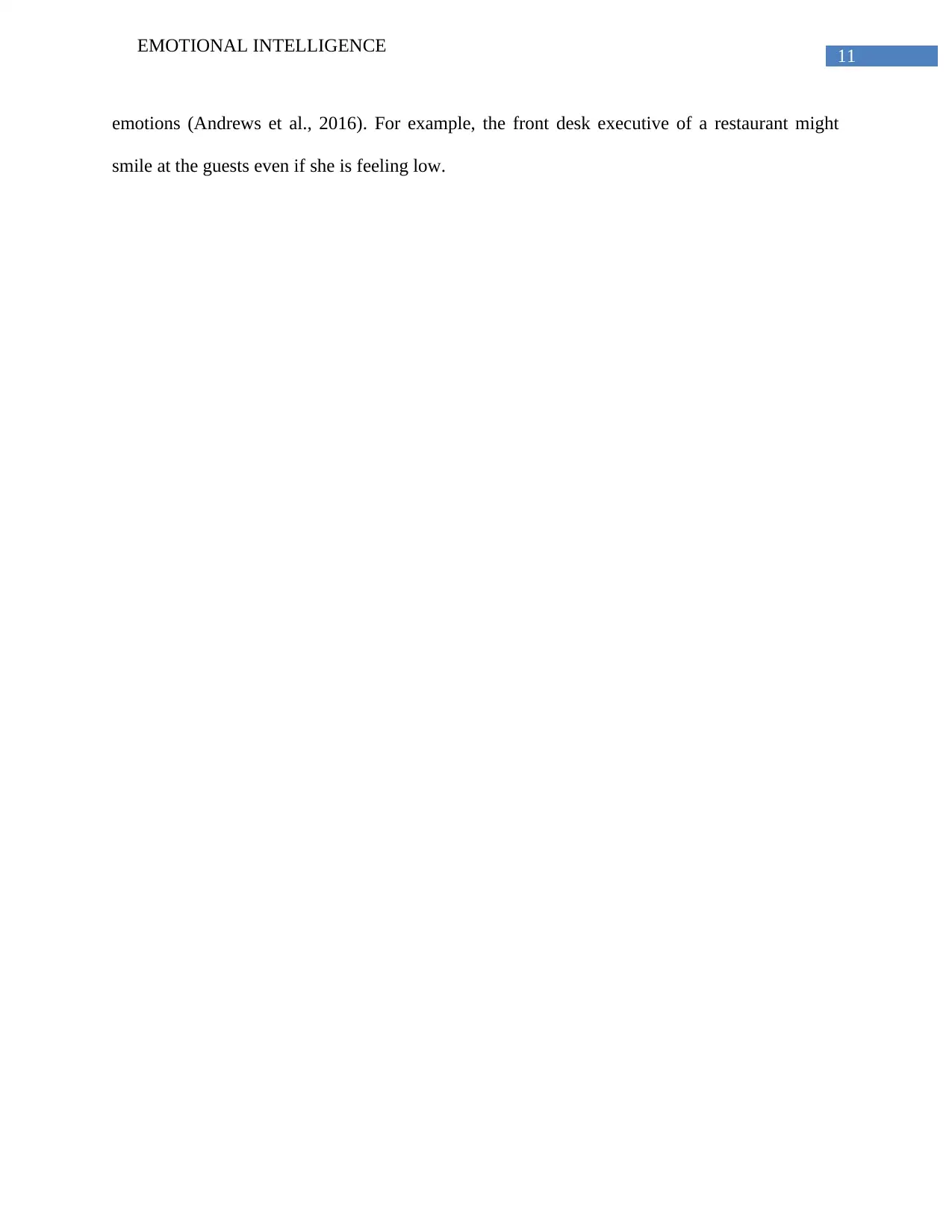
11
EMOTIONAL INTELLIGENCE
emotions (Andrews et al., 2016). For example, the front desk executive of a restaurant might
smile at the guests even if she is feeling low.
EMOTIONAL INTELLIGENCE
emotions (Andrews et al., 2016). For example, the front desk executive of a restaurant might
smile at the guests even if she is feeling low.
⊘ This is a preview!⊘
Do you want full access?
Subscribe today to unlock all pages.

Trusted by 1+ million students worldwide
1 out of 22
Related Documents
Your All-in-One AI-Powered Toolkit for Academic Success.
+13062052269
info@desklib.com
Available 24*7 on WhatsApp / Email
![[object Object]](/_next/static/media/star-bottom.7253800d.svg)
Unlock your academic potential
Copyright © 2020–2026 A2Z Services. All Rights Reserved. Developed and managed by ZUCOL.





